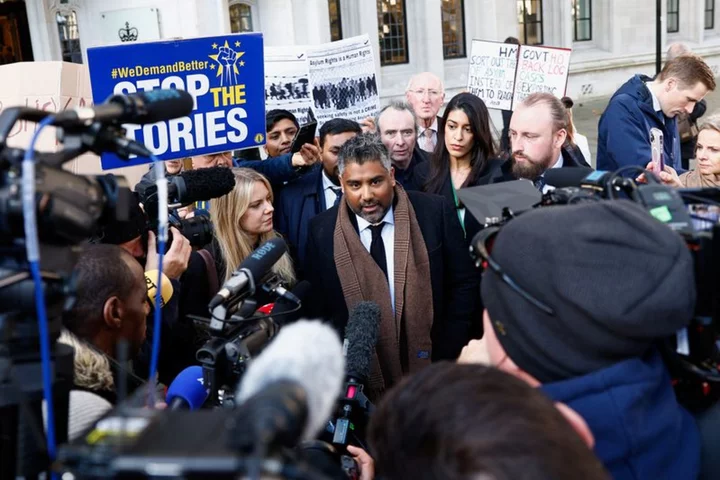By Michael Holden and Sam Tobin
LONDON Prime Minister Rishi Sunak said he would pass an emergency law and warned Britain could quit the European human rights' convention after the UK's top judges dealt him a major blow by ruling his scheme to send asylum seekers to Rwanda was unlawful.
After the UK Supreme Court said his flagship immigration policy could not proceed as it was, Sunak said he was working on a new treaty with Rwanda, and would bring in an urgent law to declare the East African nation a safe destination for migrants.
"My patience has run thin, as I do believe the country's patience has run thin, and that's why we'll take all the necessary steps to ensure that we can remove any further blockages towards getting this policy executed," Sunak told reporters.
Under the scheme, Britain intended to send tens of thousands of asylum seekers who arrived on its shores without permission to Rwanda in a bid to deter large numbers of migrants crossing the Channel from Europe in small boats.
But the top court on Wednesday ruled that Rwanda could not be considered a safe third country, delighting opponents who said the policy was unworkable and cruel, and infuriating those on the right wing of Sunak's Conservative Party.
The first planned flight to Rwanda was blocked last June after the European Court of Human Rights granted a temporary injunction to a small number of asylum seekers.
Sunak signalled to his angry lawmakers that Britain could potentially leave the European Convention on Human Rights (ECHR) and other such treaties as some have demanded, saying he would do what was necessary to allow the deportation flights to start in the spring of next year.
"I told parliament earlier today that I'm prepared to change our laws and revisit those international relationships to remove the obstacles in our way. So let me tell everybody now, I will not allow a foreign court to block these flights," he said.
"I fundamentally do not believe that anyone thinks the founding aims of the European Convention on Human Rights was to stop a sovereign parliament removing illegal migrants to a country deemed to be safe in parliamentary statute and binding international law."
The Rwanda scheme, originally drawn up by former Prime Minister Boris Johnson in an initial 140 million pound deal, is the central plank of Sunak's immigration policy as he prepares to face an election next year, amid rising concern among some voters about the numbers of asylum seekers from Europe.
The ruling had taken on even greater political significance after Sunak on Monday sacked Interior Minister Suella Braverman, a popular figure on his party's right whose remit included dealing with immigration.
She launched a scathing attack on Sunak on Tuesday, saying he had broken promises on tackling immigration and betrayed the British people.
'BROKEN PROMISES'
After becoming prime minister in October last year, Sunak, whose party is trailing by some 20 points in opinion polls, vowed to "stop the boats".
This year more than 27,000 people have arrived on the southern English coast without permission, after a record 45,755 were detected in 2022. Meanwhile the cost of housing the 175,000 migrants awaiting an asylum decision is costing 8 million pounds ($10 million) a day.
Critics, ranging from opposition lawmakers as well as some Conservatives to church leaders and the United Nations refugee agency, had argued the policy was flawed, a waste of money, immoral and simply would not work.
"He was told over and over again that this would happen, that it wouldn't work, and it was just the latest Tory (Conservative) gimmick," Keir Starmer, leader of the main opposition Labour party, told parliament.
"But he bet everything on it. And now he's totally exposed. The central pillar of his government has crumbled beneath it."
Supreme Court President Robert Reed said the five judges involved agreed there were substantial grounds to believe those sent to Rwanda would be at real risk of being returned to their country of origin where they could be at risk of ill-treatment.
This would be in breach of a number of international treaties, including the ECHR, Reed said. But he left open the chance the scheme could be resurrected, saying the changes needed to eliminate the risk might be delivered in the future.
Legal experts cast doubt on whether a new treaty would be enough to satisfy any future legal challenges.
"You would have to have Rwanda promising to fix all these things, but even that on its own I am not sure, reading the judgment, would be enough to make it safe," said Gavin Phillipson, a law professor at Bristol University.
The UK ruling will also be examined closely across Europe, where Germany and other governments are looking how to reduce the number of asylum seekers, and the European Union is seeking to overhaul the bloc's migration rules.
While Sunak's tough talk might appease some in his party, others were less impressed.
"He is under huge pressure ... I think that there is a panic brewing there," one Conservative lawmaker, who declined to be identified, told Reuters.
(Additioanl reporting by William James, Elizabeth Piper, Andrew MacAskill and Alistair Smout; Editing by Alex Richardson, Kate Holton, William Maclean and Nick Macfie)

